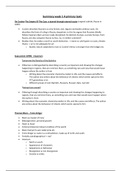Summary week 1-4 primary texts
De Custine The Empire Of The Czar; a journal through eternal russia (original subtitle; Russia in
1839)
• Custine describes Russians as very formal, dull, regular and bodies without souls. He
describes the form of ruling in Russia; despotism, to this he argues that Russians blindly
follow imperial orders and are really disciplined. He distincts Europe, scarcely Europe, from
Russia, yet also compares Russia to Asia. So, in neither continent?
• Besides that, he makes a north vs south distinction. -> warm vs cold (spain vs russia, climate
theory -> air is not adequate for art
o Buckle; nature subjected to man vs Custine’s Neva is stronger than the bridges etc
Kapuscinski (1993) - Imperium
Tomorrow the Revolts of the Bashkirs
• Otherness is distinguished by describing a country as imperium and showing the changes
happening to regions, that are common there, as something rare and new that would never
happen where the author is from
o Writing about the economic chemistry market in Ufa, and the causes and effects.
The author also writes about the behaviour of citizens which seems special to him.
YET generalises a lot.
o Different groups in text; Bashkirs, Russians, Russian state, narrator
Fleeing from oneself
• Othering through describing a country as imperium and showing the changes happening to
regions, that are common there, as something rare and new that would never happen where
the author is from
• Writing about the economic chemistry market in Ufa, and the causes and effects. The author
also writes about the behaviour of citizens which seems special to him
Thomas Mann – Tonio Kröger
• Mann as master of irony
• Bildungsroman, personal growth
• Heart vs head
• Fictional statement about condition of the world
• Mann had yet to win nobel prize etc
• Tonio Kröger as name is a contradiction, made up of north and south.
• Partially autobiographical -> wy?
• Intertext:
o North vs south
o Appearance of characters
o Appearance vs behaviour
o Bourgeoisie vs non-bourgeoisie
o Society vs artists
, o Ordinary vs exotic
o Hometown vs rest of the world
• South/mother admires blond hair, blue eyes vs North/father who looks down upon
brunettes. Lieutenant and merchant reaffirm this image.
• Function of secondary characters in this story
• Ambivalent = alright with being in between worlds in the end
• Ambiguous = early in the story, confused between the two worlds.
• Sense of homelessness, out of place. Not feeling rooted.
• Use of irony
• Setting
o Reflects his mood
o Moves back anf forth -> inner journey
o Little town as symbol for the world
o Nature reflects inner struggle
o Urban vs countryside
o Munich = ambiguous -> decision to find himself
Hrabal – Total Fears (1998)
• Makes multiple distinctions in Europe
o Warm vs Cold
▪ HE IS COLD
o East vs West (vs Central)
• Distincts them through:
o Liquor
o Nature
o Authors -> dissapointing in real life
o Shopwindow dummies
o How Russia studies is made up
▪ Literature to connect and show education / cultured
• Uses stream of consciousness
• Cold as emotion or sense of critique
• Shared sense of humanity is in appreciation for culture, nature, products and alcohol
Pringos – Orientations (1760s)
• It describes the behaviour of Greeks reaction to the West’s culture including clothing,
religion, taking care of nature and how they live their daily lives.
o Greeks look to the West, is it part of Europe or not?
o Change of behaviour, westernisation; becomes vain, clothes are different
▪ Europe corrupts
• Unfair that Europe thrives while it was built on Ancient Greece, and now Greece is declining
•
Prosper de Mérimée - Carmen (1845)
• Story within a story
• Written during peak of romanticism
• Sense of travel literature
• Stereotypes used to advance story




